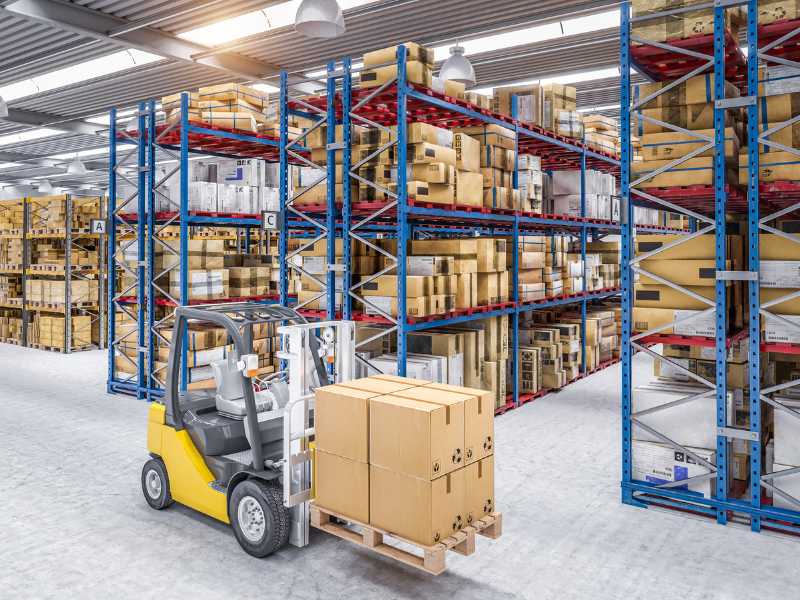What Is Omnichannel Fulfillment & Why Do You Need It?
What does “omnichannel” mean in the supply chain? This is a somewhat complex question to answer. The term omnichannel is fairly new. There is the use of the term to describe multiple sales channels and marketing channels, and the use of the term regarding multiple logistics or fulfillment channels. What are the multiple ways to market and sell a product, and what are the multiple ways in which a customer’s order is fulfilled? Below we’ll answer that.
Before we go there, we’ll deal with another question that usually arises first… what is multichannel vs omnichannel fulfillment? In straightforward terms, omnichannel involves businesses coordinating their online sales with their physical storefront sales into one fulfillment operation. Multichannel is when the various online and storefront sales are kept separate, and not integrated.
Multichannel retail involves a direct route between the brand and customer orders.
In contrast, omnichannel retail is more fluid and cyclical. Both serve multiple channels but they do so differently. Omnichannel retail considers the present-day needs and habits of customers and reaches them with marketing and buying options in multi-locations.
Omnichannel marketing and sales refer to a company’s or a product’s presence and availability. Customers can learn about and order the product in many ways. These include:
- Website
- An app on their phone
- Social media
- SMS and WhatsApp
- Over the phone through a call center
- Streaming services
- Offline in a retail store
- At an event, etc.
Today, brands are heavily investing in a digital transformation to establish an omnichannel presence across increasing sales channels. It’s all about the customer experience.
These multiple channels of marketing and sales need to be coordinated through technology, with the orders received by the company through a system that is integrated with the fulfillment company’s system. The full-service fulfillment company fills and ships the order. This includes drop-shipping.
Omnichannel eCommerce Fulfillment Services
Some use the term omnichannel fulfillment operations to refer to how and from where the customer receives their order, for example, the option of the customer buying online and picking it up at the store or buying the product in the store and having it delivered to the home.
Some companies receive customer orders from omnichannel sales channels and deliver from their warehouse, and some may ship from their store. Some might ship to a pickup depot if the customer prefers that. Customer satisfaction is always the bottom line and customer experience is considered.
The term used for buying a product online and picking it up in the store is called click and collect or Buy Online – Pick Up in Store (BOPIS). Many stores are offering this option. Another fulfillment option is drop-shipping where retailers utilize a drop-ship vendor. As mentioned, some customers request delivery of items bought in the store, some stores will fulfill an eCommerce order directly from the store, and finally, some allow items to be bought online and returned in the store.
Businesses can do omnichannel order fulfillment on their own, however, it can get expensive and very paperwork heavy. Utilizing a fulfillment operations company or full-service 3PL with omnichannel fulfillment capabilities is what many of the superstores, chains, and other brick-and-mortar stores are choosing to do.
In business-to-business (B2B) sales, companies take advantage of some or all of the aforementioned channels. How these orders are fulfilled is the second part of the equation. Omnichannel fulfillment strategy through a 3PL is a strategy that centralizes the orders and enables the businesses to get multiple sales channels fulfilled and delivered to the customer in one process.
It is a seamless approach to order fulfillment providing consumer satisfaction with a uniform, consistent shopping experience no matter where they place their order – online, on social networks, or in brick-and-mortar stores.
What Is Omnichannel Fulfillment Strategy?
Within the fulfillment centers, omnichannel is the process of inventory management that treats inventory as available to all channels from one location. The internal fulfillment processes will make adaptations to optimize operations, but the outbound process only diverges at the point of pack-out and shipping.
Customer orders from multiple channels – website, app, social media, email, streaming, brick-and-mortar store, and so forth, can be filled in a single facility from a single inventory, and the work can be done by a single workforce.
To do this, the back-end technology of the fulfillment company needs to be highly reliable and efficient, the business must have its process well-coordinated and the systems must be fully integrated. The handling rules, packaging, delivery requirements, size of the order, any VAS or kitting, the method of shipping, and special handling of packaging will be dictated by each channel.
It can be operationally challenging for fulfillment centers to handle B2B fulfillment alongside B2C and D2C. Not all 3PLs can handle omnichannel order fulfillment. Many 3PLs have limited business-to-business (B2B) capabilities.
Expertise & Systems for Handling B2B

To do omnichannel order fulfillment the fulfillment centers will need to have expertise in fulfilling business-to-business transactions (B2B) as well as business-to-consumer (B2C) and direct-to-consumer (D2C). Investigating fulfillment centers reveals many 3PLs have limited B2B capabilities.
Additionally, there are restrictions on the B2B portion of the total business. Some require that the B2B share is less than 20%.
There is a reason for this. Fulfillment operations of B2B and B2C are quite different in inventory management, warehousing, shipping, customer service, and so forth, so it can be an operational challenge for the fulfillment company. Strict attention must be paid to routing guides and staying in total compliance with the end customer’s requirements.
The B2B Team must be able to route customer orders to everything from superstores to boutiques and pay strict attention to routing guides. The end customer will have requirements that must be met.
At the fulfillment company, wholesale (B2B) orders can be directed both toward distribution centers and brick-and-mortar stores and they can be multi-box or palletized. Shipments to brick-and-mortar stores will likely contain a variety of SKUs.
Orders that are palletized will likely contain several boxes, and they’ll be destined for distribution centers. B2B orders will often have Bills of Lading or other lengthy paperwork associated with them. These inventory management and warehousing fulfillment processes may be the reason 3PLs limit their B2B business.
So, what does a business do if more than 20% of their orders are B2B or their current 3PL cannot handle omnichannel fulfillment?
Businesses will need to look for a full-service fulfillment company that is highly experienced with omnichannel fulfillment, with inventory management and warehouse systems technology that can handle B2B, B2C, and D2C. They must be tooled with the latest in direct response functionality and flexibility to integrate as a seamless back-end operation.
What Are Omnichannel Order Fulfillment Models?
The fulfillment operations models will depend on the order fulfillment centers. For most pick and pack operations, the 3PL will group orders into waves, batches, or single orders. When this is done, the customer orders are entered into the employees’ pick list via shopping cart integration at the distribution center almost immediately.
The employees will not know what marketplace they are picking for. Through automation and quality control, they will be able to accomplish pick and pack while taking as few steps as possible. This creates streamlined fulfillment processes with accuracy, speed, and flexibility.
The warehouse management system (WMS) at the fulfillment center must be flexible enough to support the needs of every B2B, B2C, and D2C client including those that market and ship their products direct-to-consumer in combination with their B2B business.
Warehouse management systems are vitally important, making the management of inventory possible throughout the omnichannel order fulfillment process. The WMS must be able to service multiple channels and allocate the right levels of inventory based on the demand and forecasting of each channel.
The software needs to find the most cost-efficient way to sort SKUs based on physical characteristics, velocity, and order profiles. Dependent on software sophistication, omnichannel fulfillment processes can reduce repetitive activities for different distribution channels.
What are the Benefits of Omnichannel Fulfillment?

Our title question asked, ‘why do you need omnichannel fulfillment?’ When you look at the expanding online options for marketing and selling products, it’s easy to understand why it’s needed – customers are driving the demand. Today brands are heavily investing in a digital transformation to establish an omnichannel presence across increasing sales channels as they know this is the preferred customer experience, with efficiency vital to customer satisfaction.
Changes in shopping have taken place over the past three years, with significantly less buying taking place in brick-and-mortar stores and significantly more shopping being done from home with an expectation of speedy and efficient fulfillment delivery. The changing buying habits didn’t come of their own accord, of course, but came with the COVID lockdown.
Changing Buying Habits
The COVID-19 pandemic forced everyone to change the way they shop. As the lockdown continued, supply chains tightened, and fulfillment centers scrambled to deal with the changes as quickly as they could. Shoppers began to grow accustomed to online shopping.
Curbside pickup also increased. Shopping online and getting home delivery has become the norm in recent years. This change in the way people shop has created a need for omnichannel fulfillment centers. A huge number of shoppers have permanently changed their shopping habits.
In the past three years, eCommerce has emerged as the fastest-growing sector of the U.S. marketplace. Despite the contraction of most businesses during the pandemic, firms and new startups have continued to enter and expand their presence in eCommerce markets. Analysis shows a high percentage of all shopping today is beginning online and the number of purchases made online is steadily increasing.
Ecommerce currently represents a small share of overall commerce, but it is expected to continue to expand rapidly in the coming years. As eCommerce grows, so will its impact on the overall economy and the retailers that support Brick and Mortar (B&M). B&M is considered an important touchpoint, giving the consumer an actual location to interact with the store personnel and directly experience the products.
Businesses sell products and services through stores, websites, and marketplaces. Omnichannel businesses provide shopping across physical stores, online stores, marketplaces, mobile apps, and catalogs. They cater to customers’ expanding needs and expectations.
Seeking Customer Satisfaction
There are many options and a wide variety of choices in omnichannel order fulfillment, and customers are driving this expansion. Customers will discover a product they want, find out all about it, check the different prices across different channels, and perhaps even search on Amazon as well as the company website, and they can choose any one of these as a place to buy, options from social media to the brick and mortar store. While the customer is doing this, they are experiencing the product and brand.
With omnichannel marketing, sales, and fulfillment operations, a customer can explore some clothing on Instagram, then go to the store to check options out and verify the quality. They find the right color is not in the store, so the customer gets an in-store coupon to redeem and returns to online shopping for the exact color wanted.
The customer checks to see if there is a lower price anywhere including Amazon, makes the purchase online and gets the purchase verified via email, or text gets shipping notifications when the fulfillment company ships, receives the product knowing that if they’re dissatisfied, they can return it to the store. This is the customer experience.
When a customer has so many options for their purchase, and the purchasing goes so smoothly, they’ll begin to appreciate the brand. The big idea is that, in omnichannel, every customer interaction changes the customer’s overall experience of a product and brand, and the goal is, of course, customer satisfaction and brand loyalty in the future.
How it Looks Today
It’s certainly hard to say, but what we do know is that hardly anyone today shops exclusively through a single medium. We see our youngest generation plus consumers of all generations buying online, in-store, and on multi-marketplaces.
We see the giants like Amazon, Target, and Walmart focusing on the omnichannel model and philosophy. As this discipline broadens, so will customer expectations. Very soon single channel retail marketing will become obsolete, and this in itself answers the question of why you need it.
The vital player in this changing world is the omnichannel fulfillment company. Not all 3PLs are set up to handle the full demands of omnichannel. The basic processes in fulfillment operations are warehouse organization and inventory management, order processing, packaging, and shipping and returns.
Omnichannel fulfillment companies must have the technology to be able to handle all types of customer orders – business-to-business (B2B), business-to-consumer (B2C), and direct-to-consumer (D2C). And do so much more! A full-service omnichannel 3PL will provide everything, including customer service.
And timely delivery is increasingly important to online sales because it affects the satisfaction of the buyer. Omnichannel order fulfillment is an excellent solution for speedy delivery. The omnichannel order fulfillment model arranges and manages orders professionally at the right time, in the right quantity for the buyer.
Thus, the seller can sell goods, and gain profits without losing processing time and delivery while buyers are satisfied when receiving products on time. Exceptional flexibility is required for a successful omnichannel operation.

AMS Fulfillment is one of the nation’s leaders in providing full-service omnichannel fulfillment. The company is bi-coastal and has been in the fulfillment business for more than 20 years. With its software sophistication and years of experience working within an omnichannel distribution and fulfillment environment, AMS is a company of experts. They can handle your B2B, B2C, and D2C fulfillment.
If you need an omnichannel fulfillment service you can rely on, we invite you to Contact Us at AMS.
GET IN TOUCH
See what AMS can do for your omnichannel fulfillment!
LET’S CONNECT




